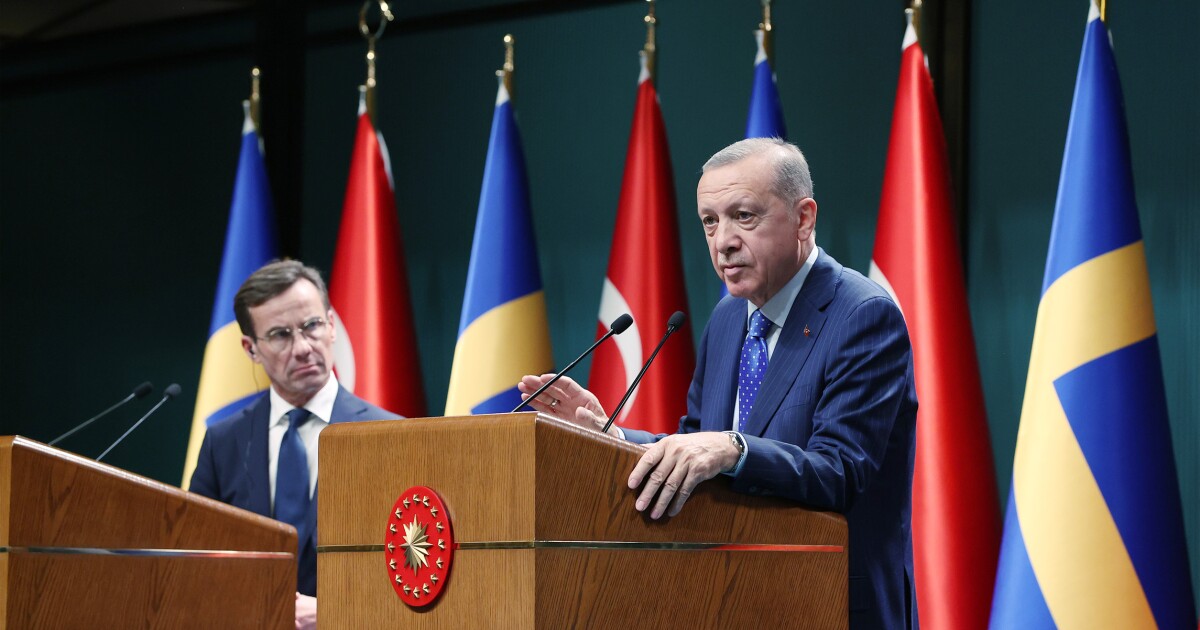

At NATO headquarters these days, leaders talk about plans to add Finland and Sweden to the 30-nation alliance as if it’s virtually a done deal — at least, that’s the public stance.
“All allies made a historic decision, including Turkey, to invite Finland and Sweden to join this alliance. We did that in June,” said Secretary-General Jens Stoltenberg at last month’s meeting of NATO foreign ministers in Bucharest, Romania. “Already 28 allies have ratified in the national parliaments. So, so far, this has been the quickest accession process in NATO’s modern history.”
FORMER NATO CHIEF CALLS ON US TO LIFT ‘SELF-IMPOSED RESTRICTIONS’ ON UKRAINE AID
The United States and almost all NATO allies are anxious for the two formerly nonaligned Nordic democracies to join the alliance — not just for their military capabilities and strategic location on the Baltic Sea, but as an in-your-face repudiation of Vladimir Putin’s irredentist ambitions for Russia.
Finland, with its 832-mile land border with Russia and its small but highly capable military that is armed with NATO-compatible weapons, would be a particularly valuable addition to the alliance. The alliance, of course, was formed in 1949 as a counterweight to the former Soviet Union with just 12 founding members.
But NATO is an organization that’s run by consensus. That means any significant action requires the approval of all current members.
And it turns out two outliers are not so anxious for Finland and Sweden to join the club: Turkey and Hungary, the two NATO nations friendliest with Russia.
Turkish President Recep Tayyip Erdogan was the first to leverage his country’s veto power to extract promises from the aspirants. That forced Finland and Sweden to sign a trilateral memorandum in return for a formal invitation to join NATO.
Both countries had to agree to lift any restrictions on arms sales to Turkey and recognize Kurdish militants and other groups as terrorists, as well as extradite to Turkey anyone it names as a terror suspect.
Meanwhile, Erdogan has distanced himself from NATO’s hard-line stance on Russia’s invasion of Ukraine, refusing to impose sanctions or ban flights from Moscow.
Instead, the increasingly autocratic Turkish leader has positioned himself as a go-between, brokering a deal signed in Istanbul in June to allow Ukraine to resume shipping grain from its Black Sea ports.
“Ankara is trying to use the Russian invasion to further increase its regional and global influence by assuming the role of mediator,” wrote Iliya Kusa, an analyst with the Ukrainian Institute for the Future.
“That would strengthen Turkey’s reputation and influence in the region and allow it to lay claim to the role of chief mediator between Russia and the West at a time when the ties between them are unraveling.”
Having once considered Turkey as a “strategic ally” and a “strong and reliable partner,” Ukraine has “stopped seeing its relationship with Turkey as part of its partnership with the West,” Kusa wrote.
And despite Finland and Sweden having largely bent to Erdogan’s will, Ankara continues to say neither nation has fully met Turkey’s conditions.
After meeting with his Swedish and Finnish counterparts on the sidelines of the Bucharest ministerial, Turkish Foreign Minister Mevlut Cavusoglu said Turkey needs to see “concrete steps” before it can give its approval.
“We do not ignore the steps that were taken,” Cavusoglu said. “However, there is no concrete development yet on some issues, such as the extradition and the freezing of terrorist assets.”
Meanwhile, the other holdout, Hungary, is led by Prime Minister Viktor Orban — the NATO leader most sympathetic to Putin.
While Orban continues spreading the Kremlin’s narratives about the war in Ukraine, he consistently opposes sanctions against Moscow.
Just this month, Orban showed how he could frustrate the will of the West by killing an $18.9 billion European Union aid package for Ukraine. The move infuriated fellow EU members that, like NATO, rely on consensus to take action.
The dispute was over an internal EU matter. But “Orban could not have given Putin a nicer present,” said Daniel Freund, a German member of the European Parliament, who accused the Hungarian leader of “abusing the veto like no one before him.”
But unlike Erdogan, Orban is promising that Hungary will not veto Finland and Sweden’s application and that his Parliament will approve the expansion of NATO from 30 to 32 members as soon as it meets in January.
“The Swedes and the Finns have not lost a single minute of membership because of Hungary, and Hungary will certainly give them the support they need to join,” Orban said last month after a meeting with fellow prime ministers from NATO nations Poland, the Czech Republic, and Slovakia.
“I can tell you that the government has already made a decision,” he said, according to Euronews. “We have already confirmed to both Finland and Sweden that Hungary supports the membership of these two countries in NATO.”
Publicly, NATO’s Jens Stoltenberg continues to express confidence all will be resolved in the end. “Finland and Sweden are delivering on the trilateral memorandum … and are also committed to a long-term cooperation with Turkey,” he said last month at a press conference. “I’m confident that all allies will ratify. I will not speculate about exactly when, but the sooner, the better.”
Finland and Sweden may ultimately win Turkey over and join the alliance. But the process has underscored two potential problems as NATO grows larger.
CLICK HERE TO READ MORE FROM THE WASHINGTON EXAMINER
The more countries in the club, the harder it may be to get everyone to agree on a course of action — for instance, invoking the alliance’s Article 5, which says an attack on one is an attack on all.
And if countries such as Hungary and Turkey begin to move away from democratic principles and cozy up with potential adversaries, the alliance has no process to remove a member once they’ve joined.





